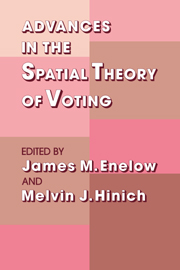Book contents
- Frontmatter
- Contents
- Foreword
- ADVANCES IN THE SPATIAL THEORY OF VOTING
- 1 Introduction
- 2 Multiparty Competition, Entry, and Entry Deterrence in Spatial Models of Elections
- 3 Heresthetic and Rhetoric in the Spatial Model
- 4 Spatial Strategies When Candidates Have Policy Preferences
- 5 A Decade of Experimental Research on Spatial Models of Elections and Committees
- 6 Candidate Uncertainty and Electoral Equilibria
- 7 The Theory of Predictive Mappings
- 8 Multicandidate Spatial Competition
- 9 The Setter Model
- Author Index
- Subject Index
5 - A Decade of Experimental Research on Spatial Models of Elections and Committees
Published online by Cambridge University Press: 05 March 2012
- Frontmatter
- Contents
- Foreword
- ADVANCES IN THE SPATIAL THEORY OF VOTING
- 1 Introduction
- 2 Multiparty Competition, Entry, and Entry Deterrence in Spatial Models of Elections
- 3 Heresthetic and Rhetoric in the Spatial Model
- 4 Spatial Strategies When Candidates Have Policy Preferences
- 5 A Decade of Experimental Research on Spatial Models of Elections and Committees
- 6 Candidate Uncertainty and Electoral Equilibria
- 7 The Theory of Predictive Mappings
- 8 Multicandidate Spatial Competition
- 9 The Setter Model
- Author Index
- Subject Index
Summary
ABSTRACT
The Euclidean representation of political issues and alternative outcomes, and the associated representation of preferences as quasiconcave utility functions, is by now a staple of formal models of committees and elections. This theoretical development, moreover, is accompanied by a considerable body of experimental research. We can view that research in two ways: as a test of the basic propositions about equilibria in specific institutional settings, and as an attempt to gain insights into those aspects of political processes that are poorly understood or imperfectly modeled, such as the robustness of theoretical results with respect to procedural details and bargaining environments. This essay reviews that research so that we can gain some sense of its overall import.
A considerable body of political theory represents alternative outcomes or policies by a subset of n-dimensional Euclidean space, and assumes that we can represent individual preferences over these outcomes by quasiconcave utility functions with internal satiation points. By imposing this particular structure on alternatives and preferences, we can deduce a variety of substantively informative results, such as the Median Voter Theorem in elections, and the generic emptiness of cores in cooperative political games (cf. Plott 1967, Schofield 1983). Correspondingly, the special case of Euclidean preferences, introduced by Davis and Hinich (1966, 1968), form the basis for the most extensively developed models of two general classes of political institutions – elections and committees.
Information
- Type
- Chapter
- Information
- Advances in the Spatial Theory of Voting , pp. 99 - 144Publisher: Cambridge University PressPrint publication year: 1990
Accessibility standard: Unknown
Why this information is here
This section outlines the accessibility features of this content - including support for screen readers, full keyboard navigation and high-contrast display options. This may not be relevant for you.Accessibility Information
- 36
- Cited by
